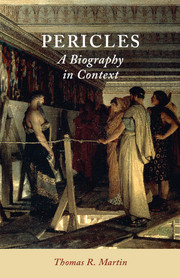Book contents
- Frontmatter
- Dedication
- Epigraph
- Contents
- List of Illustrations
- List of Maps
- Acknowledgments
- Chronology
- Pericles' Alcmeonid Family Tree
- Introduction: A Biography of Pericles in the Context of the Ancient Sources
- 1 The Notorious Family History of Pericles' Mother
- 2 The Harsh Lessons of the Career of Pericles' Father
- 3 Pericles Becomes a Teenager during a Family Crisis and a National Emergency
- 4 Pericles Becomes a Refugee during Athens' Greatest Peril
- 5 Pericles Becomes an Adult as Athens Builds an Empire
- 6 Pericles' Innovative Education for Leadership in Athenian Democracy
- 7 Pericles Becomes a Leader as Athens and Sparta Become Enemies
- 8 Pericles Becomes the First Man of Athens
- 9 Pericles' Responsibility for the Samian Revolt and the Peloponnesian War
- 10 Pericles' Fate, Then and Later
- Suggested Readings
- Index
Introduction: A Biography of Pericles in the Context of the Ancient Sources
Published online by Cambridge University Press: 05 August 2016
- Frontmatter
- Dedication
- Epigraph
- Contents
- List of Illustrations
- List of Maps
- Acknowledgments
- Chronology
- Pericles' Alcmeonid Family Tree
- Introduction: A Biography of Pericles in the Context of the Ancient Sources
- 1 The Notorious Family History of Pericles' Mother
- 2 The Harsh Lessons of the Career of Pericles' Father
- 3 Pericles Becomes a Teenager during a Family Crisis and a National Emergency
- 4 Pericles Becomes a Refugee during Athens' Greatest Peril
- 5 Pericles Becomes an Adult as Athens Builds an Empire
- 6 Pericles' Innovative Education for Leadership in Athenian Democracy
- 7 Pericles Becomes a Leader as Athens and Sparta Become Enemies
- 8 Pericles Becomes the First Man of Athens
- 9 Pericles' Responsibility for the Samian Revolt and the Peloponnesian War
- 10 Pericles' Fate, Then and Later
- Suggested Readings
- Index
Summary
One night in Athens in the mid-490s B.C. (the exact year is unknown), a rich and heavily pregnant woman named Agariste had a dream: she saw herself giving birth to a lion. A few days later her second son was born, and his parents named him Pericles. Ancient Greeks traditionally believed that dreams were sent from the gods, as they learned from the epic poems The Iliad and The Odyssey by Homer; his famous stories explored the sufferings caused by the Trojan War and expressed foundational beliefs of Greek culture. From listening to myths about ancient heroes and from hunting lions, which still roamed Europe in antiquity, Greeks learned that these animals were both powerful defenders of their own group and fierce destroyers of their prey. Agariste understood her dream to be a divine message indicating that her child was to become a very special person, for good or for bad – or for both.
Agariste's premonition about her child's future prominence proved accurate. Pericles at the height of his career became the most famous leader of the most famous and radical democracy of the most famous place of the most famous era of ancient Greece (Figure 1). During Pericles' lifetime in the fifth century B.C. (he died in 429), Athens became Greece's most influential incubator of far-reaching cultural developments, from scientific and philosophical ideas to innovative forms of art, architecture, and theater. This aspect of Athenian history has gained an appreciative reception in later times. Far less positive, however, has been the assessment of the actions of the Athenians toward other Greeks in this same period as they transformed themselves from their previous second-rate international status into their region's wealthiest and strongest military power. By the 430s, they controlled numerous other Greek allies in what Pericles memorably called a tyranny, according to the contemporary historian and military commander Thucydides (The Peloponnesian War 2.63); other contemporaries echoed that judgment, adding that Pericles led Athens as a de facto tyrant. Many modern scholars agree, labeling the Athenian-dominated alliance an empire and Pericles an imperialist, implying all the deeply negative connotations of those terms in their modern context of colonialism and oppression.
- Type
- Chapter
- Information
- PericlesA Biography in Context, pp. 1 - 24Publisher: Cambridge University PressPrint publication year: 2016



